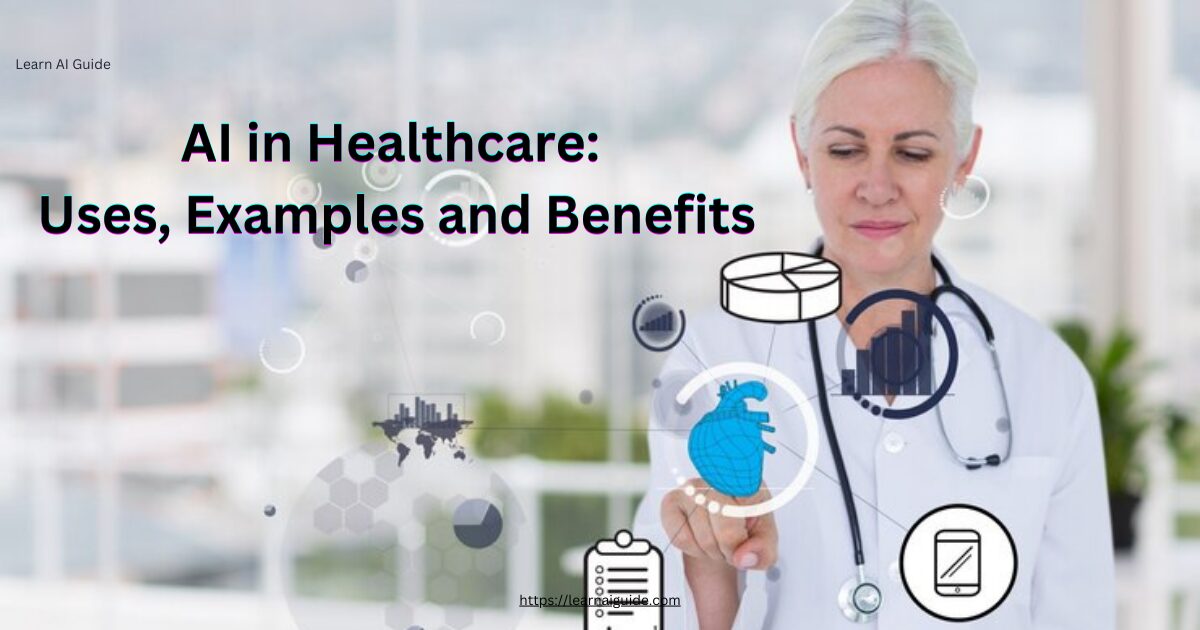AI in Healthcare
Artificial intelligence (AI) is changing healthcare, offering new solutions to old problems. This article explores how AI is used in healthcare, shares real-life examples, and discusses the benefits and drawbacks of AI. AI in Healthcare: Uses Examples and Benefits
Understanding these aspects can help healthcare workers keep up with the latest technology.
What is AI in Healthcare?
Artificial intelligence in healthcare uses smart computer systems to analyze complex medical data. AI systems can read large amounts of information from medical records, images, and genetic data.
These abilities help AI assist in diagnosing diseases, planning treatments, and monitoring patients, making healthcare delivery more efficient and accurate.
How is AI Used in Healthcare?
AI is used in many ways in healthcare, including:
- Diagnostic Imaging: AI helps doctors find diseases in X-rays and MRIs more accurately.
- Personalized Medicine: AI creates custom treatment plans based on a patient’s unique data.
- Remote Patient Monitoring: AI-powered devices monitor patients’ health in real-time and alert doctors to any issues.
AI in Healthcare Examples
- AI in Diagnostic Imaging
Artificial Intelligence is very useful in diagnostic imaging. For example, AI programs can find early signs of diseases like cancer in X-rays and MRIs, often more accurately than human doctors. This speeds up diagnosis and reduces errors.
- AI in Personalized Medicine
AI helps doctors create personalized treatment plans. By analyzing a patient’s genetic information and lifestyle, AI can suggest the best treatments. This approach improves patient outcomes and reduces costs.
- AI in Remote Monitoring
Wearable devices with AI can track patients’ vital signs in real-time. These devices alert doctors to any problems, allowing for quick action. For example, AI can predict heart attacks or strokes by analyzing data patterns, potentially saving lives.
10 Benefits of Artificial Intelligence in Healthcare
Better Diagnostic Accuracy
One of the biggest benefits of AI in healthcare is its ability to improve diagnostic accuracy. AI systems can find patterns and problems in data that humans might miss, leading to more accurate and faster diagnoses.
Improved Efficiency
AI makes administrative tasks like scheduling, billing, and resource management more efficient. Hospitals using AI can better manage their operations, reduce wait times, and improve patient experiences.
Cost Savings
AI’s efficiency and accuracy lead to cost savings. By reducing errors, optimizing treatments, and preventing unnecessary procedures, AI helps healthcare providers save money. Automating administrative tasks with AI also cuts labor costs.
Personalized Patient Care
AI allows for personalized patient care by analyzing individual health data and tailoring treatments. This personalized approach improves patient outcomes and satisfaction.
Advancements in Medical Research
AI speeds up medical research by analyzing large datasets to find potential new drugs and predict their success. This accelerates drug discovery and brings new treatments to patients faster.
Remote Monitoring and Telemedicine
AI-powered devices and telemedicine platforms enable continuous patient monitoring, especially for those with chronic conditions. These technologies allow for remote consultations and interventions, reducing the need for hospital visits and improving access to care.
Early Disease Detection
AI can detect early signs of diseases like Alzheimer’s or Parkinson’s before symptoms appear, allowing for early intervention and better outcomes.
Workflow Optimization
AI optimizes hospital workflows by automating routine tasks and supporting decision-making. This reduces the administrative burden on staff and improves overall efficiency.
Improved Patient Engagement
AI enhances patient engagement by providing personalized health recommendations and reminders. For example, AI-powered apps can remind patients to take their medications and follow treatment plans.
Enhanced Data Security
AI improves data security by detecting and addressing potential cyber threats. Healthcare organizations can use AI to monitor network activity and protect patient data.
Disadvantages of AI in Healthcare
Data Privacy and Security Concerns
While AI offers many benefits, it also raises concerns about data privacy and security. Healthcare providers must ensure patient data is protected and comply with regulations to prevent data breaches.
Integration Challenges
Integrating AI with existing healthcare systems can be difficult. Compatibility issues and the need for significant upgrades can hinder AI adoption, requiring substantial investments and technical expertise.
Ethical and Legal Issues
The ethical and legal implications of AI in healthcare are complex. Questions about AI decision-making, accountability, and patient consent need to be addressed to ensure ethical use.
Resistance to Change
Some healthcare professionals may resist adopting AI due to concerns about job displacement or skepticism about AI’s reliability. Effective training and education are essential to overcoming this resistance.
Future of AI in Healthcare
The future of AI in healthcare looks bright, with ongoing advancements and increasing acceptance. AI will likely play a crucial role in personalized medicine, public health, and global healthcare initiatives.
As AI continues to evolve, its integration into healthcare systems will become smoother, further enhancing the quality and accessibility of care.
In conclusion, AI is transforming healthcare by improving diagnostic accuracy, efficiency, and patient care. Despite some challenges, the benefits of AI in healthcare are clear.
Embracing AI can revolutionize the industry, offering better care and outcomes for patients around the world.
For more detailed insights and examples, you can refer to resources like “How AI is used in healthcare PDF” and various “Artificial intelligence in healthcare research paper PDF” documents available online.
AI in Healthcare: Uses Examples and Benefits That’s all for today, For more : https://learnaiguide.com/why-ai-will-never-replace-humans/
